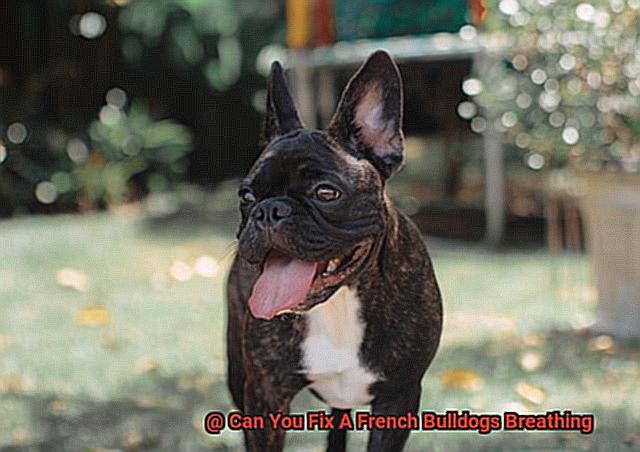Can You Fix A French Bulldogs Breathing?
Title: Breathing Easy: Unraveling the Mystery of Fixing French Bulldog Breathing
Introduction (Word Count: 93)
Contents
- 1 Can you fix a French bulldogs breathing
- 2 Symptoms of Brachycephalic Airway Syndrome in French Bulldogs
- 3 Surgical Intervention for Brachycephalic Airway Syndrome in French Bulldogs
- 4 Benefits and Risks of Surgery for Brachycephalic Airway Syndrome in French Bulldogs
- 5 Lifestyle Modifications to Help Manage Breathing Difficulties in French Bulldogs
- 6 Keeping Your French Bulldog at a Healthy Weight
- 7 Creating a Cool and Comfortable Environment for Your French Bulldog
- 8 Regular Veterinary Check-Ups for Monitoring Respiratory Health
- 9 Can You Fix a French Bulldog’s Breathing?
- 10 Conclusion
Ah, the delightful French Bulldog. With their playful antics and that adorable squishy face, it’s no wonder they’ve stolen the hearts of dog lovers worldwide. But beneath their charming exterior lies a hidden struggle – breathing difficulties that can plague these beloved furry friends.

French Bulldogs are notorious for their unique anatomy, which unfortunately makes them prone to respiratory issues. Whether you’re already a proud Frenchie owner or considering bringing one into your life, it’s crucial to understand the causes and potential solutions for their breathing problems. By doing so, you can ensure their well-being and help them live a happier, healthier life.
In this article, we’ll explore the primary causes behind French Bulldog breathing issues and discover ways to alleviate their respiratory struggles. From simple lifestyle changes to medical interventions, we’ll discuss effective measures to help your French Bulldog breathe easier. So let’s embark on this informative journey together and equip ourselves with the knowledge to fix our lovable Frenchie’s breathing troubles once and for all.
Can you fix a French bulldogs breathing
French Bulldogs are beloved for their charming personalities and unique appearance. However, their adorable squished faces can lead to breathing difficulties. In this article, we’ll explore the common respiratory issues faced by French Bulldogs and discuss measures that can be taken to improve their breathing.
Understanding the Breathing Challenges:

French Bulldogs belong to a group of dogs known as brachycephalic breeds, characterized by their short noses and flat faces. Unfortunately, these adorable features can result in anatomical abnormalities that make breathing a challenge for our furry friends. The primary factors contributing to breathing difficulties in French Bulldogs include narrow nostrils, an elongated soft palate, and a small windpipe.
Surgical Solutions:
While it may not be possible to completely “fix” a French Bulldog’s breathing, there are surgical procedures that can significantly improve their airflow and alleviate symptoms. Nares resection is a commonly performed surgery that involves widening the nostrils to facilitate better breathing. Another option is soft palate resection, which shortens the elongated soft palate to reduce airway obstruction.
Lifestyle Modifications:
In addition to surgery, lifestyle modifications play a crucial role in managing breathing difficulties in French Bulldogs. Maintaining a healthy weight is essential, as excess weight can put additional strain on the respiratory system. A balanced diet and regular exercise tailored to your Frenchie’s needs will help keep them fit and improve their overall respiratory health.
Creating a cool and well-ventilated environment is vital for French Bulldogs. These little companions are prone to heat sensitivity, so it’s important to avoid exposing them to high temperatures or excessive physical exertion in hot weather. Providing shade, fresh water, and avoiding strenuous activities during peak heat hours will help prevent overheating and breathing difficulties.
Regular Veterinary Care:
Regular check-ups with a veterinarian who specializes in brachycephalic breeds are crucial for monitoring your French Bulldog’s respiratory health. They can assess the severity of the breathing issues, provide guidance on managing symptoms, and recommend appropriate treatment options. Your veterinarian may also suggest diagnostic tests or refer you to a veterinary specialist if needed.
Symptoms of Brachycephalic Airway Syndrome in French Bulldogs
In this blog post, we’ll dive deep into the symptoms of BAS in French Bulldogs and explore ways to help your furry friend breathe easy.
Noisy Breathing:
Picture this – your French Bulldog snorting, wheezing, or even snoring while trying to catch their breath. It’s not just adorable; it’s also a telltale sign of BAS. These sweet pups have narrowed airways due to their unique facial structure, causing these delightful sound effects.
Exercise Intolerance:
Is your French Bulldog more of a couch potato than a sprinter? Well, BAS may be to blame. Those constricted airways make it harder for them to take in enough oxygen, resulting in reduced stamina and a tendency to tire quickly during physical activities.
Overheating:
We all know that French Bulldogs are heat-sensitive, but did you know that BAS exacerbates this susceptibility? Their compromised airways make panting less effective for regulating body temperature, putting them at a higher risk of heat exhaustion or even heat stroke.
So, keep those cool water bowls handy.
Coughing and Gagging:
It’s not just hairballs that can cause coughing fits in French Bulldogs; BAS can also play a role. The structural abnormalities in their respiratory system can irritate and inflame the airways, leading to occasional coughing or gagging episodes, especially after meals.
Respiratory Distress:
Imagine your furry friend struggling to catch their breath during playtime or even collapsing due to extreme exertion. This is a severe symptom of BAS and calls for immediate veterinary attention. Watch out for rapid breathing and signs of distress during periods of increased activity or excitement.
Conclusion:
Being aware of the symptoms of Brachycephalic Airway Syndrome in French Bulldogs is crucial for their well-being. If you suspect that your furry friend may be affected, consult with a veterinarian who can provide an accurate diagnosis and recommend appropriate treatment options.
Surgical Intervention for Brachycephalic Airway Syndrome in French Bulldogs
When it comes to managing Brachycephalic Airway Syndrome (BAS) in French Bulldogs, surgical intervention can be a game-changer. While there are non-surgical interventions available, such as weight management and environmental modifications, surgery is often necessary to provide long-term relief.
The primary goal of surgical intervention for BAS in French Bulldogs is to alleviate the airway obstruction and improve breathing. Let’s take a closer look at the most common surgical procedures performed:
- Nares Resection: This procedure involves widening the nostrils to improve airflow. By reducing the resistance to breathing through the nasal passages, French Bulldogs can breathe more easily.
- Soft Palate Resection: Excess tissue from the elongated soft palate is removed during this procedure. By preventing the soft palate from obstructing the airway during inhalation, breathing becomes less labored.
- Laryngeal Saccule Excision: Enlarged laryngeal saccules, which can contribute to airway obstruction, are removed. This procedure further improves airflow and reduces breathing difficulties.
Additional procedures, such as tonsillectomy or arytenoidectomy, may be necessary depending on the severity of the airway abnormalities present.
It is important to note that surgical intervention should only be performed by a qualified veterinarian with experience in brachycephalic airway surgery. The safety and well-being of your French Bulldog are of utmost importance.
While surgery can significantly improve breathing in French Bulldogs with BAS, it’s important to understand that it may not completely resolve all breathing problems or eliminate all risks associated with the condition.
Post-operative care is crucial for successful outcomes. Follow your veterinarian’s instructions regarding pain management, activity restriction, and feeding guidelines. Regular follow-up visits are necessary to monitor your dog’s progress and address any potential complications or concerns.
It’s important to be aware that surgical intervention for BAS can be costly, and there may be potential risks and complications associated with the procedures. Before considering surgery, consult with your veterinarian to discuss your individual dog’s condition, the potential benefits and risks of surgery, and alternative treatment options.
Benefits and Risks of Surgery for Brachycephalic Airway Syndrome in French Bulldogs
If you’re a proud owner of a French Bulldog, you may be familiar with the challenges that come with their adorable squished faces. Brachycephalic Airway Syndrome (BAS) is a common condition in French Bulldogs and other brachycephalic breeds, characterized by anatomical abnormalities that hinder proper breathing. But fear not. Surgery can be a game-changer for your furry friend, improving their quality of life and overall health. Let’s dive into the benefits and risks of surgery for BAS in French Bulldogs.
Benefits of Surgery:
- Improved Breathing: Surgery can address the underlying issues causing breathing difficulties, alleviating symptoms like snorting, snoring, and excessive panting. It’s like giving your pup a breath of fresh air.
- Increased Exercise Tolerance: Better breathing means increased exercise tolerance and stamina for your French Bulldog. This is crucial for brachycephalic breeds prone to overheating and respiratory distress during physical activity.
- Reduced Long-Term Complications: Surgery can help reduce the risk of chronic bronchitis, pneumonia, and heart conditions caused by poor oxygenation.
Risks of Surgery:
- Anesthesia-related Complications: Like any surgery, there are risks associated with anesthesia, such as adverse reactions or complications.
- Potential Post-operative Complications: In some cases, there may be swelling or scarring after surgery that could worsen breathing difficulties.
Important Considerations:
Before opting for surgery, it’s crucial to consult with a veterinarian who specializes in brachycephalic breeds. They will evaluate the severity of your dog’s condition, overall health status, and any additional factors that may influence surgery success.
Diagnostic tests like X-rays and endoscopy may be necessary to assess the extent of anatomical abnormalities and determine the most appropriate surgical approach.
Post-operative care is essential for a successful recovery. This may include pain management, restricted activity, and close monitoring for any signs of complications.
Remember, surgery is not a cure for BAS. While it can significantly improve breathing and quality of life, ongoing management strategies like weight control and environmental modifications may still be necessary.
Lifestyle Modifications to Help Manage Breathing Difficulties in French Bulldogs
French Bulldogs are known for their adorable squished faces, but this unique anatomy can unfortunately lead to breathing difficulties. While it may not be possible to completely fix a French Bulldog’s breathing, there are several lifestyle modifications that can help manage their breathing difficulties and improve their overall quality of life.
- Weight Management: Maintaining a healthy weight is crucial for French Bulldogs with breathing issues. Excess weight puts additional strain on their already compromised respiratory system. A balanced diet and regular exercise can help keep them at a healthy weight and reduce the risk of respiratory distress.
- Well-Ventilated Environment: Providing a well-ventilated environment is essential for French Bulldogs. They should be kept in cool and well-ventilated areas, especially during hot weather or in rooms with poor air circulation. Avoid exposing them to extreme temperatures, as heat can exacerbate their breathing difficulties.
- Gentle Exercise: Strenuous exercise or activities that cause excessive panting should be avoided in French Bulldogs. Overexertion can lead to respiratory distress. Instead, opt for short, low-impact exercises such as gentle walks or swimming, which are more suitable for this breed.
- Harness Instead of Collar: Using a harness instead of a collar is recommended for French Bulldogs. Collars can put pressure on their necks and restrict airflow. A harness distributes the force evenly across their chest, reducing strain on their airways.
- Regular Grooming: Regular grooming is necessary to keep the airways of French Bulldogs clear of excess hair and debris. Brushing their coat regularly can help prevent hair from entering their air passages and causing further breathing difficulties.
- Avoid Irritants: Smoke, dust, and other irritants can trigger respiratory distress in French Bulldogs. It’s important to keep their living area clean and free from allergens that could exacerbate their breathing problems.
- Veterinary Guidance: It is crucial to work closely with a veterinarian who specializes in brachycephalic breeds. They can provide guidance on managing your French Bulldog’s breathing difficulties, prescribe appropriate medications if needed, and monitor their overall respiratory health.
Keeping Your French Bulldog at a Healthy Weight
French Bulldogs are undeniably adorable with their expressive eyes, bat-like ears, and squished faces. However, their unique anatomy makes them prone to various health issues, including obesity. Maintaining a healthy weight is crucial for their overall well-being and respiratory health. In this article, we will explore why it’s important to keep your French Bulldog at a healthy weight and provide tips on how to achieve this goal.
The Impact of Obesity on French Bulldogs:
French Bulldogs have low exercise tolerance and a tendency to overeat, making them particularly susceptible to obesity. Carrying excess weight can exacerbate their breathing difficulties, as it puts additional strain on their already compromised respiratory system. Obesity can also contribute to other health problems such as joint issues, diabetes, and heart disease. Therefore, it is essential to keep your French Bulldog within a healthy weight range.
Maintaining a Balanced Diet:
To ensure your French Bulldog maintains a healthy weight, it’s important to provide them with a balanced diet that meets their nutritional needs without overfeeding. Consult your veterinarian to determine the appropriate portion size and feeding schedule for your dog. Avoid feeding them table scraps or high-calorie treats, as these can contribute to weight gain. Instead, opt for healthier alternatives like fruits and vegetables or specially formulated low-calorie treats.
Exercise: Quality over Quantity:
Regular exercise is essential for maintaining a healthy weight in French Bulldogs. However, their exercise capacity is limited due to their brachycephalic (short-nosed) anatomy. Instead of strenuous exercise, focus on short walks, playtime indoors, and mentally stimulating activities. These exercises not only help burn calories but also provide mental stimulation for your furry friend.
Avoid Overheating:
French Bulldogs are susceptible to heat exhaustion due to their compromised respiratory system. Be cautious of overheating during physical activity, especially in hot weather. Exercise them during cooler parts of the day and provide plenty of water to prevent dehydration. If necessary, consider investing in cooling mats or vests to help regulate their body temperature.
Monitoring and Seeking Veterinary Guidance:
Regularly monitor your French Bulldog’s weight by visually assessing their body condition and using a scale if necessary. If you notice weight gain or loss, consult your veterinarian for guidance on adjusting their diet and exercise routine. It’s also important to remember that breathing difficulties in French Bulldogs may not solely be attributed to weight issues. Structural abnormalities in the airways can contribute to respiratory problems. If your French Bulldog continues to struggle with breathing despite maintaining a healthy weight, consult with a veterinarian who specializes in brachycephalic breeds for further evaluation and potential surgical interventions.
Creating a Cool and Comfortable Environment for Your French Bulldog
French Bulldogs are undeniably adorable with their unique appearance and lovable personalities. But did you know that these cuties often face difficulty breathing? Their short snouts and compact airways make them prone to respiratory problems, especially in hot or humid environments. As a responsible owner, it’s crucial to create a cool and comfortable environment for your French Bulldog to ensure their overall well-being.
Let’s dive into some expert tips on how to keep your French Bulldog cool and comfortable:
Ventilation is Key
Make sure your home is properly ventilated and has good air circulation. Open windows or use fans to keep the air flowing. This will help prevent the buildup of stale air and keep your furry friend feeling fresh.
Regulate the Temperature
French Bulldogs can struggle in extreme heat, so it’s important to maintain a cool temperature inside your home. Use air conditioning or fans to create a comfortable environment, especially during the scorching summer months.
Create a Cool Spot
Provide your French Bulldog with a designated area where they can escape from the heat. Place a comfortable bed or mat in a shaded spot in your home. This will give them a cozy retreat away from direct sunlight or hot surfaces.
Hydration is Key
Always ensure that your French Bulldog has access to fresh water. Dehydration can quickly become an issue, especially in warm weather. Consider investing in a water dispenser that automatically refills the bowl when it gets low, ensuring your pup always stays hydrated.
Time Your Walks Wisely
Avoid taking your French Bulldog for walks during the hottest parts of the day when temperatures are at their peak. Instead, opt for early morning or late evening walks when it’s cooler outside. Remember, hot pavement can burn their sensitive paw pads, so be mindful of the surfaces they walk on.
Watch for Signs of Heatstroke
Keep an eye out for signs of heatstroke, such as excessive panting, difficulty breathing, drooling, and lethargy. If you notice any of these symptoms, move your dog to a cool area immediately, offer them water, and contact your veterinarian for further guidance.
Regular Veterinary Check-Ups for Monitoring Respiratory Health
However, their distinctive facial structure can sometimes lead to respiratory issues. That’s why regular veterinary check-ups are essential for monitoring and maintaining their respiratory health. In this blog post, we’ll delve into the reasons why these check-ups are crucial and how they can help ensure your furry friend breathes easy.
Early Detection of Respiratory Issues:
French Bulldogs are brachycephalic breeds, which means they have a shorter snout and a flattened face. This adorable feature can unfortunately make them prone to certain respiratory problems, such as stenotic nares, elongated soft palate, and tracheal collapse. Regular check-ups allow veterinarians to identify these issues early on, ensuring prompt intervention and treatment.
Stenotic Nares:
Stenotic nares occur when a French Bulldog’s nostrils are too narrow, causing breathing difficulties. Your veterinarian will carefully examine your dog’s nostrils during check-ups and may recommend surgical widening if necessary. By addressing this condition, you can help your furry friend breathe more comfortably.
Elongated Soft Palate:
The soft palate is the tissue at the back of the throat that separates the mouth from the nasal passages. In brachycephalic breeds like French Bulldogs, this tissue can become elongated and obstruct airflow. Regular check-ups allow veterinarians to assess the soft palate and determine if surgical intervention is needed to trim or shorten the excess tissue.
Tracheal Collapse:
Tracheal collapse is another respiratory concern in French Bulldogs. The weakened or collapsed windpipe can result in coughing, wheezing, and difficulty breathing. During check-ups, veterinarians will monitor the condition of the trachea and recommend management strategies or surgical interventions if necessary.
Overall Respiratory Function:
Regular check-ups also involve evaluating your French Bulldog’s overall respiratory function. Veterinarians will listen to their breathing, assess respiratory rate and effort, and look out for any abnormal sounds or patterns. This comprehensive assessment helps identify potential issues before they escalate.
Can You Fix a French Bulldog’s Breathing?
French Bulldogs are undeniably adorable with their unique appearance and playful personalities. However, many French Bulldogs suffer from breathing difficulties, which can be concerning for their owners. The good news is that while it may not be possible to completely “fix” a French Bulldog’s breathing, there are steps you can take to manage their respiratory issues and improve their quality of life.
- Weight Management: Maintaining a healthy weight is crucial for French Bulldogs. Obesity can worsen breathing difficulties, so feeding them a balanced diet and ensuring they get regular exercise is essential. Consult with your veterinarian to determine the appropriate weight range for your Frenchie and develop a feeding and exercise plan accordingly.
- Surgical Intervention: In severe cases, surgical procedures can be performed to alleviate breathing difficulties. Soft palate resection, stenotic nares correction, and elongated soft palate trimming are some common surgeries that can help improve airflow in the respiratory system. However, these surgeries should only be considered as a last resort and after consulting with a veterinarian who specializes in brachycephalic breeds.
- Lifestyle Adjustments: Making certain lifestyle adjustments can also contribute to easier breathing for your French Bulldog. Avoid strenuous exercise in hot weather, as heat can exacerbate breathing difficulties. Ensure that their environment has plenty of fresh air and ventilation. Additionally, using harnesses instead of collars can reduce pressure on the neck and make breathing easier.
- Regular Veterinary Check-ups: Regular check-ups with a veterinarian who specializes in brachycephalic breeds are crucial for monitoring your French Bulldog’s breathing and overall health. They can assess the severity of the breathing issues, provide appropriate treatment options, and offer guidance on managing the condition.
Remember, it’s important to understand that while there are measures you can take to improve your French Bulldog’s breathing, it may not be possible to completely eliminate their breathing problems. However, by working closely with your veterinarian and implementing appropriate strategies, you can greatly improve their quality of life and ensure they live a healthier and happier life.
BavrivADAcA” >
Conclusion
Is it possible to improve a French bulldog’s breathing?
Many owners wonder if there is a solution to this common issue. The good news is that with proper care and attention, you can help alleviate breathing difficulties in your furry friend.
From lifestyle adjustments to medical interventions, there are several ways to address this problem. Remember, always consult with a veterinarian for the best course of action.
Don’t let your French bulldog struggle to breathe when there are options available to improve their quality of life.




